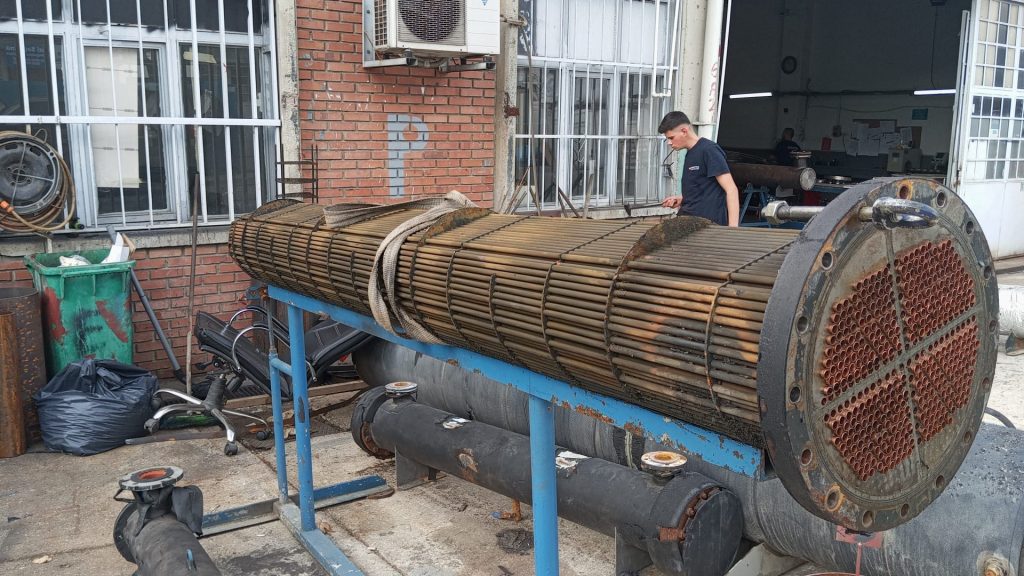Role of Heat Exchanger in Industry?
The role of heat exchangers in industry is absolutely fundamental. They are the unsung workhorses of the industrial world, critical for efficiency, safety, process control, and conservation.
In essence, a heat exchanger’s role is to transfer thermal energy from one fluid to another without mixing them. This simple function enables a vast array of essential industrial processes.
Here’s a breakdown of their key roles across various sectors:
1. Process Heating and Cooling
This is the most direct and widespread role. Heat exchangers are used to raise or lower the temperature of a stream to the exact condition required for a chemical reaction or process step.
- Heating: Using steam, hot oil, or a hot process stream to heat a cooler fluid. Example: Pre-heating crude oil before it enters a distillation column in a refinery.
- Cooling: Using cooling water, air, or a refrigerant to cool down a hot process stream. Example: Cooling the product from a chemical reactor to stop the reaction or prepare it for storage.
. Heat Recovery and Energy Efficiency (Conservation)
This is a crucial economic and environmental role. Heat exchangers capture waste heat from one process and reuse it elsewhere, dramatically reducing energy costs and fuel consumption.
- Example 1 (Pre-heating): A recuperator uses hot exhaust flue gases from a furnace to pre-heat the cold combustion air entering that same furnace. This improves combustion efficiency and saves fuel.
- Example 2 (Cogeneration): A ** Waste Heat Boiler** captures heat from high-temperature exhaust gases to produce steam, which can then be used for process heating or to generate electricity.
3. Condensation and Evaporation
They facilitate phase changes, which are central to many systems.
- Condensation: Converting a vapor into a liquid by removing latent heat. Example: The condenser in a refrigeration or power plant cycle (like in a steam turbine condenser) where spent steam is condensed back into water.
- Evaporation / Boiling: Adding heat to a liquid to turn it into a vapor. Example: A reboiler at the bottom of a distillation column provides the necessary heat to create vapors for the separation process.
4. Thermal Management (Heat Rejection)
This role is about removing unwanted heat from a system and rejecting it to the environment to prevent overheating and maintain optimal operating conditions.
- Example 1: An intercooler or aftercooler on an air compressor cools the compressed air, increasing its density and improving efficiency.
- Example 2: A radiator in a vehicle engine cools the engine coolant by rejecting heat to the atmosphere.
- Example 3: Cooling hydraulic oil in heavy machinery to maintain viscosity and prevent damage.
5. Separation and Purification
Many separation processes, like distillation, are entirely dependent on heat exchangers (reboilers and condensers) to function.
6. Pollution Control
Heat exchangers play a role in reducing environmental impact.
- Example: Cooling exhaust gases before they enter scrubbers or electrostatic precipitators, making the pollution control equipment more effective and efficient.
Industry-Specific Applications
| Industry | Primary Role of Heat Exchangers | Common Examples |
| Oil & Gas / Refining | Heating crude oil, cooling products, fractionation | Shell and Tube exchangers throughout the refinery for distillation, catalytic cracking, and hydrotreating processes. |
| Chemical & Petrochemical | Precise temperature control for reactions, separation | Reactor feed effluent exchangers, distillation column reboilers and condensers. |
| Power Generation | Steam condensation, feedwater heating | Steam Surface Condensers (to create vacuum for turbine), feedwater heaters. |
| HVAC & Refrigeration | Heat rejection, evaporation/condensation | Evaporators (absorb heat) and Condensers (reject heat) in chillers and AC units. |
| Food & Beverage | Pasteurization, sterilization, cooling, concentration | Plate Heat Exchangers for milk/juice pasteurization, scraped surface exchangers for viscous products. |
| Pharmaceutical | Highly sanitary heating/cooling, precise temp control | Sanitary double tube-pipe or plate exchangers for drug manufacturing. |
| Marine | Cooling engine jacket water, lube oil, fuel | Plate Heat Exchangers used for compactness and efficiency on ships. |
Summary: Why Are They Indispensable?
- Energy Conservation: They are the primary tool for reducing energy waste, lowering costs, and minimizing the carbon footprint of industrial operations.
- Process Necessity: Many fundamental industrial processes (distillation, evaporation, condensation) are impossible without them.
- Product Quality & Safety: Precise temperature control ensures product consistency, prevents dangerous runaway reactions, and protects equipment from thermal damage.
- Economic Efficiency: The capital cost of a heat exchanger is almost always offset by the massive operational savings from reduced energy consumption.
